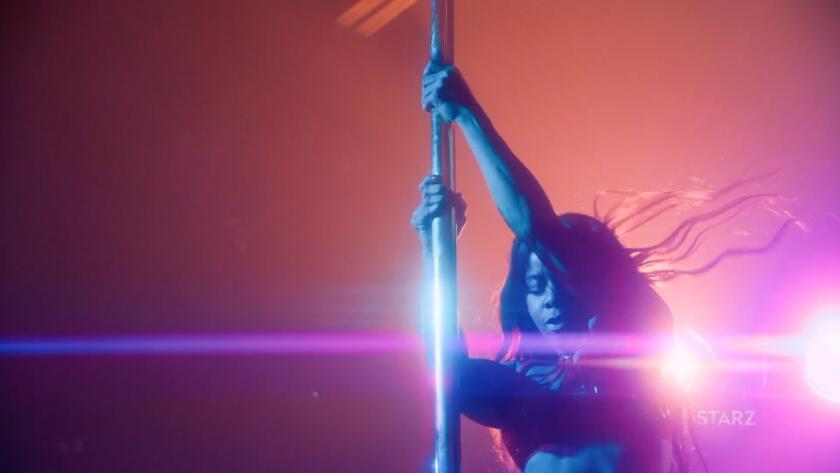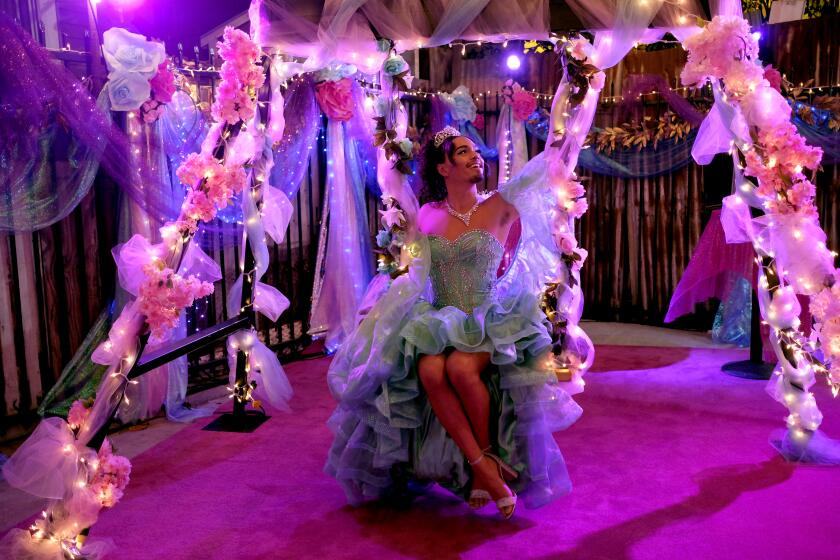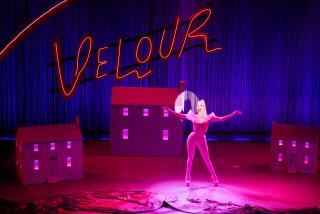Hollywood considered Black strip clubs ‘taboo.’ Then came ‘P-Valley’
If you’re wondering what the ‘P’ in ‘P-Valley’ stands for, look no further than the title of Katori Hall’s 2015 play: “Pussy Valley.” Starz urged the playwright-turned-showrunner to abbreviate the name of her new series, which debuts Sunday — though not, Hall said, because the network itself was squeamish.
“We were gonna go for it, but when conversations started happening between the network and the cable carriers, they were basically saying they were not going to list the show if it was in the title,” she explained. “So it was actually censorship on the part of the carrier, not the network.
“Starz made a business decision: ‘We don’t want to make a great show and not have people see it because people are afraid of this word,’” she continued. “But that’s just a reflection of where we are as a culture about anything that is connected to women and the female body. Sure, it’s not the most elegant of words, but it’s raw and it’s real.”
The same can be said of “P-Valley,” which, though titillating, presents the stars of strip clubs in all their athletic, artistic glory. These are not the seedy spots of Los Angeles’ industrial districts; these are the communal hot spots of the South, where scantily clad acrobats — queen bee Mercedes (Brandee Evans), cherubic Keyshawn (Shannon Thornton) and newcomer Autumn (Elarica Johnson) — defy societal norms and gravity in a single stunt. The poles at the Pynk are their pulpits; the Mississippi crowds’ showers of money are valuable applause.
Hall talked to The Times about carefully capturing these women’s artistry, giving thanks to Cardi B and Jennifer Lopez and finding the answer to the series in the most important meal of the day. The following has been edited for clarity and condensed.
An open letter protests systemic racism in the American theater. How can we can get back on track? Start by reading the plays providing a roadmap.
The Pynk is unlike any strip club I’ve ever seen on screen.
I think what a lot of people don’t know about Black Southern strip clubs specifically is that it’s not taboo. It’s the thing to do. I’m a Memphis native, so being from the South, I frequented strip clubs all the time. You celebrate bachelorette and bachelor parties there. I’ve even been to a baby shower at a strip club! It’s truly a central hub where you can cross paths with friends and politicians and rappers, and it’s very much part of the fabric of social activity down South.
I was always so enthralled by what I saw, because it goes beyond just women taking the clothes off. The women who are up on those stages, they were putting forth a theatrical experience. I felt like I was at Cirque du Soleil. They were pulling themselves up poles, hanging themselves upside down — they were showcasing the expertise that is needed in order to accomplish these athletic feats. And the throwing of the money showers are a show of affection for the experience these women are giving you.
Magic City in Atlanta has the Snack Pack, a group of women who do these complicated routines where they’re lifting each other up on the pole. It’s much more of an acrobatic act than a strip tease, a lot of them don’t even take off their floss. They’re scantily clad — it is a strip club so that’s part of the costume — but you’re really seeing a blend of burlesque and gymnastics versus just a female body that’s naked onstage.
What did it take to shoot these sequences?
Oh my God, that was the most challenging piece of the entire production. Number one, casting actresses who were comfortable enough with the requirements and had a certain level of strength. They each took pole dancing classes on their own. Once everyone was in Atlanta for filming, we paired them with each other so that they could not only get their acting chemistry, but also get their dance chemistry. These women were going to have to learn how to trust each other if they were going to be up on that pole together.
Our choreographer Jamaica Craft is Atlanta-based and has such a respect for exotic dancing. She had a good eye for orchestrating the best moves for the camera so that on the day, everyone knew exactly how to move in order to capture the most expressive moments of the routines. She first tested the routines with a core group of dancers who used to work at these clubs, and then they would teach the stunt doubles. Each actor had two doubles — the work is so strenuous we didn’t want to wear anyone’s body out.
All of those things had to come together to create a believable moment where you’re like, “Mercedes is actually upside down on the pole, holding herself and twerking on the ceiling.” Luckily, Brandee [Evans] has a background in dance, having performed with Katy Perry, Usher and Beyoncé. She came into the role physically ready and ended up doing quite a lot of her own stunts. That big billboard in L.A. off the 405? That’s not her double, that’s her.
That Mercedes moment from the pilot — the music drops out, the crowd’s cheers lower, and the only sounds we really hear are her heavy breathing, her heels on the ceiling and her arms and thighs as they hit the pole. What was the strategy behind that sound design?
When Mercedes gets up on that pole, the world just falls away. But unfortunately, on the day, we weren’t able to get the camera on the pole with her, so we were lacking POV shots from her perspective, and we wanted it to feel more subjective. I worked with our sound supervisor John Bowen to make something that articulates the exertion of the dance.
That one moment alone allows the audience to get inside Mercedes’ body, to feel the strain, the pressure, the fear. Is she gonna fall or is she gonna fly? You can hear the crowd rising back up as she drops down that pole head first, and you hear the screech of her thighs on the pole as she catches herself. It wasn’t much, but to me, those sounds and that silence tell the story of the hard work in ways I don’t think dialogue could.
The character Mercedes performs in a scene from Starz’ “P-Valley,” which showcases strippers as athletes and artists.
Lorene Scafaria’s “Hustlers” reframes how strippers are seen on-screen, with the help of a rock solid ensemble including Jennifer Lopez, Constance Wu, Lili Reinhart and Cardi B.
What research did you do to create these characters?
I went to clubs in [Washington] D.C., Atlanta, Memphis, L.A., all over the nation, and interviewed about 40 women over six years, but because of the volume of research I had, I really struggled with landing on just one story. It became this three-hour play — which, really, was this smorgasbord of characters and plot that we could follow for years.
I pivoted to a [series] pitch and luckily had a great meeting at Starz. Some people wouldn’t even hear my pitch or even allow me in the room because, back in 2015, the subject matter was still largely taboo. But these women are human beings, just like you and me. Sex work is work — you may not agree with the work, but it’s putting food in their families’ mouths, putting these people through school. It is saving lives. I think the world is now ready to hear their stories in a more respectful way.
How so? What’s changed over these past few years?
A few things. Pole fitness has gotten more respect as a real sport. I started writing the play after I took a class and almost vomited — like, this is some hard work, this is art, this is a craft, this deserves to be an Olympic sport. And the explosion of Cardi B: this stripper-turned-rapper and her kind of unapologetic personality brought people a new perspective on who these women are. She has no shame that she used to dance, and even claimed respect for it in hip-hop, a predominantly male space.
And even though there were many movies already — “The Players Club,” “Striptease,” “Showgirls,” “Magic Mike” — “Hustlers” centered the perspective of these women; they weren’t being used as props in someone else’s story. I mean, J.Lo was on a pole during the Super Bowl! That’s the biggest sign of how far strip club culture has come, from these seedy places to a stadium. All of these pop culture flashpoints have really rolled out the red carpet for “P-Valley” to get people’s attention and respect. I’m very grateful to have had all those predecessors before our launch.
We asked networks and streaming platforms of all stripes to tell us what we can expect to see on TV during our coronavirus summer. Here’s what they told us.
“P-Valley” doesn’t just center these women, but seems to literally look up to them.
Yes — every episode is directed by a woman and, visually, we’re turning the table. Usually in other projects, the camera is angled where we’re looking down on these women, and we did make a concerted effort to always frame them from a perspective where they felt larger than life. More than just the athleticism and the art that they’re doing night after night, they have been able to carve out a state of empowerment in such an exploitative space.
That to me is what women do everywhere. It doesn’t matter if you’re working in a hospital, a bodega, the White House — women are always pushing up against oppression. And for Black women, it’s oftentimes intersectional levels of oppression.
It’s been done by others, but how did you adapt a play into a TV show?
It took me four years to develop it into a show, so I’ve been on this odyssey for 10 years, but it’s been well worth it. It’s still about this group of women and their workplace, but because we’ve added this David-versus-Goliath fight against these people who want to tear down the strip club and build a casino, that workplace exists within an environment where there are so many levels of conflict: political, social, economical.
It’s the story of the underdog in American society, with this unexpected, in-depth investigation of all these systems of oppression: racism, sexism, classism. We always joke in the writers room, “This is ‘The Wire’ with women!”
In Season 3 of Starz’s “Vida,” Marcos celebrates his 30th birthday with an epic, gender-bending queer quinceañera. Here’s how they pulled it off.
Music plays a big role in “P-Valley.” How did you go about selecting songs?
The music was everything because, as we know, Migos got their start through places like Magic City. Careers have been made inside these spaces. So I really wanted people who grew up down South to see themselves in the music. Three 6 Mafia, Playa Fly — people will know I’m from Memphis!
And I’m so happy that in the period since the play in 2015 to now, female emcees like Megan Thee Stallion and City Girls have risen to the top. Our music supervisors combed through Instagram and SoundCloud to showcase female voices; our goal was to have it be 50-50, but we didn’t reach our goal because, unfortunately, that industry is what it is. I will make sure we up that in future seasons. But we made sure we paired our female artists with extremely strong visuals: a dance moment, a montage moment. We wanted the placement to feel important and memorable.
I’m most proud of the music of Lil’ Murda [the on-screen rapper who keeps trying to get his song played at the Pynk].
Why?
We were really struggling to find writers who could write Lil’ Murda’s music. This guy who makes my omelette every morning — cheese, jalapeños and onions — told my assistant, “By the way, I’m a rapper. Can you show this to your boss?” My co-EP Patrik-Ian Polk listened to it and said it was actually pretty good; when I heard it, I was like, “Oh my god, that’s Lil’ Murda. The rhythm, the braggadocio. That’s him!”
We licensed the song and worked with a group of rappers and producers to make a couple changes, and J. Alphonse Nicholson re-recorded it. I’m of the mind to give people a chance when they’re ready. This person who made my breakfast every day — who goes by FM New Money — was actually the missing piece of the show.
You’re one of the hundreds of theater makers who signed the open letter titled “We See You, White American Theater.” What do you want people to know about this initiative?
When that letter started circulating, it felt like those were the words that I have been wanting to say to various theaters, and I very quickly signed my name. I have experienced on so many levels the hypocrisy of working in American theater, and we have come to a point where it has to change.
Change is happening, whether you like it or not. There is a reckoning happening in our world, and our society is on the precipice of extreme cultural transformation. And if theater wants to continue actually reflecting our society, it must acknowledge the roots of supremacy that are embedded in the very way that they do their business, and work to dismantle those roots. If not, I don’t even know if it can even survive.
My hope is that people move away from performing diversity and actually strive towards equality. I do not want any more performances. I want action.
‘P-Valley’
Where: Starz
When: 9 p.m. Sunday
Rated: TV-MA (may be unsuitable for children under the age of 17)
More to Read
The complete guide to home viewing
Get Screen Gab for everything about the TV shows and streaming movies everyone’s talking about.
You may occasionally receive promotional content from the Los Angeles Times.









